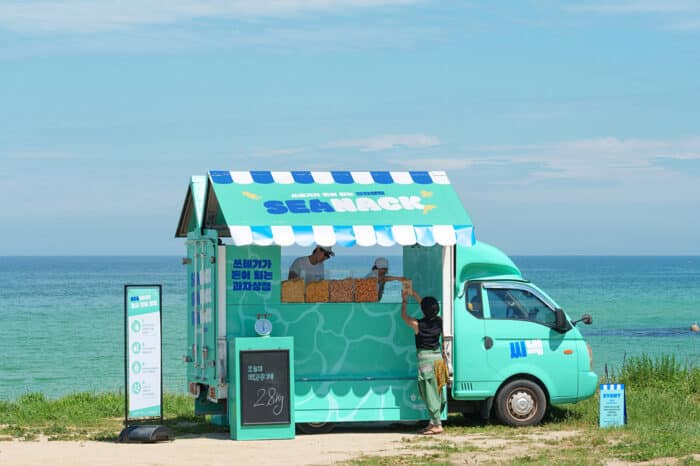In recent years, there has been a growing awareness of the environmental impact of plastic waste, particularly in our oceans. While there are many efforts to clean up these marine environments, one initiative in South Korea is taking a unique approach by gamifying the process of litter collection.

The “Seanack” project, as it is called, aims to turn coastal waste into currency by giving snacks to beach goers in exchange for discarded waste. This innovative campaign has gained popularity in South Korea and is becoming a model for other countries to follow.
What is the Seanack Project?

The Seanack project is a joint effort by the South Korean government, a local snack company, and a recycling organization. The campaign was launched in the summer of 2020 as a way to encourage beach goers to pick up litter and help keep the coast clean.
The program works by setting up collection stations along the beach where visitors can bring in their litter and exchange it for tokens that can be used to purchase snacks. The snacks are provided by a local company, and the program is funded by the government and the recycling organization.
The goal of the program is to encourage people to take responsibility for the waste they generate and help to keep the beaches clean. By gamifying the process and providing an incentive in the form of snacks, the program aims to make the process of litter collection more enjoyable and engaging.
How Does the Program Work?

The Seanack program is simple to participate in. Visitors to the beach can pick up a bag from the collection station and start picking up litter along the coast. Once they have collected a certain amount of waste, they can bring it back to the collection station and exchange it for tokens.
These tokens can then be used to purchase snacks from the participating snack company. The snacks offered include a range of popular items such as ice cream, chips, and drinks. The program has proven to be very popular among visitors to the beach, with many people participating in the litter collection and snack exchange.
What are the Benefits of the Seanack Project?

The Seanack project has several benefits for both the environment and the community. First and foremost, the program helps to keep the beaches clean and free of litter. This, in turn, benefits marine life and helps to maintain a healthy ecosystem.
The Seanack project is still in its early stages, but it has already had a positive impact. According to Save the Earth, the Seabin machines have collected over 23,000 plastic bottles, 71,000 cigarette butts, and 12,000 pieces of styrofoam since the project was launched in July 2021. These numbers show that the project is helping to reduce the amount of litter that ends up in the ocean.
The program also has a positive impact on the community by encouraging people to take responsibility for the waste they generate. By providing an incentive in the form of snacks, the program makes the process of litter collection more enjoyable and engaging.
In addition, the program supports the local economy by partnering with a local snack company. This helps to create jobs and supports the growth of small businesses in the area.
The Seanack project also serves as a model for other countries looking to address the issue of plastic waste in their coastal environments. By gamifying the process of litter collection and providing an incentive for participants, the program has proven to be successful in engaging the community and encouraging responsible waste management.
Wrap Up
The Seanack project is a unique and innovative approach to addressing the issue of plastic waste in our oceans. By gamifying the process of litter collection and providing an incentive in the form of snacks, the program has proven to be successful in engaging the community and encouraging responsible waste management.
The program has many benefits, including keeping the beaches clean, supporting the local economy, and promoting responsible waste management. The Seanack project serves as a model for other countries to follow as they work to address the issue of plastic waste in their coastal environments.
















